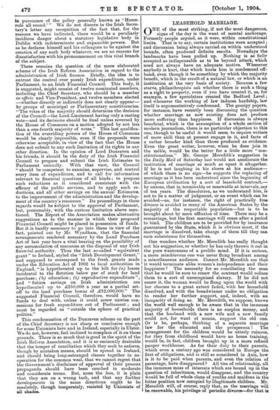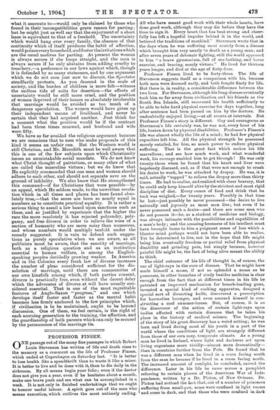LEASEHOLD MARRIAGE.
ONE of the most striking, if not the most dangerous, signs of the day is the want of mental anchorage. Formerly people argued, as it were, within constitutional limits. That is to say, certain institutions were accepted ; and discussion being always carried on within understood bounds, often produced definite results. Nowadays the landmarks have been pulled up. Nothing is so fully accepted. as indispensable as to be beyond attack, which need not always have an adequate motive. Whenever anybody is hurt, that which hurts him is condemned off- hand, even though it be something by which the majority benefit, which is the result of a natural law, or which is an institution at the very basis of society. Because a few starve, philanthropists ask whether there is such a thing as a right to property, even if you have created it, as, for example, a few speculators created the Bedford Level ; and whenever the working of law induces hardship, law itself is argumentatively condemned. The gossipy papers, for instance, have recently been discussing the question whether marriage as now existing does not produce more suffering than happiness. If discussion is always beneficial, which is the assumption of a whole section of modern journalism, there is no particular objection to this one, though to be useful it would seem to require writers of more skill than at present engage in it, and facts of a rather broader kind than those produced as evidence. Even the great writer, however, when he does join in the melee, would be the better for a little more "con- stitutionalism." Mr. George Meredith's suggestion in the Daily Mail of Saturday last would not ameliorate the institution of marriage so much as upset it altogether. If he is not laughing in his sleeve at his audience— of which there is no sign—he suggests the replacing of marriage as it has been understood since the beginning of European civilisation by a sort of leasehold contract,— by unions, that is, terminable or renewable at intervals, say of ten years. The dissolution, as we understand him, is not to be a matter of judgment, or an event which can be avoided—as, for instance, the right of practically free divorce is avoided in many of the American States by the majority of the respectable population—but is to be brought about by mere effluxion of time. There may be a remarriage, but the first marriage will cease after a period to bind. The children are to be provided for by insurance guaranteed by the State, which it is obvious must, if the marriage is dissolved, take charge of them till they can earn subsistence for themselves.
One wonders whether Mr. Meredith has really thought out his suggestion, or whether he has only thrown it out in the pure wantonness of a prolific mind. If it is serious, a more mischievous one was never flung broadcast among a miscellaneous audience. Cannot Mr. Meredith see that it would terminate alike women's independence and their happiness ? The necessity for so conciliating the man that he would be sure to renew the contract would reduce them to a sort of unrecognised slavery. If he did not renew it, the woman would be flung upon the world with her charms to a great extent faded, with her household dissolved, and with the breadwinner under no obligation to render her further support, and, indeed, with an incapacity of doing so. Mr. Meredith, we suppose, knows the world well enough to be aware that in the immense majority of households there is no surplus money, and that the husband with a new wife and a new family could not, for want of means, support the old one. Or is he, perhaps, thinking of a separate marriage law for the educated and the prosperous ! The arrangement for the children would be utterly ruinous, for they from childhood would have no home training, would be, in fact, children brought up in a more refined pauper workhouse. As for their duty to their parents, which even a century ago was considered in Europe the first of obligations, and is still so considered in Asia, how is it to be paid when parents, and even the relation of parentage, have disappeared? All ties of relationship, all the immense mass of interests which are bound up in the question of inheritance, would disappear, and the country would be full of whole clans of youths and maidens in the bitter position now occupied by illegitimate children. Mr. Meredith will, of course, reply that, as the marriage will be renewable, his privilege of periodic divorce—for that is what it amounts to—would only be claimed by those who found in their incompatibilities grave reason for parting ; but he might just as well say that the enjoyment of a short lease is equivalent to that of a freehold. The uncertainty which would hang over every family, the absence of that continuity which of itself produces the habit of affection, would poisonevery household, and foster the irritations which are the usual motives for parting. At present the woman is always secure if she keeps straight, and the man is always secure if he only abstains from adding cruelty to treachery,—a preference in our laws against which, though it is defended by so many statesmen, and by one argument which we do not care just now to discuss, the Spectator steadfastly protests. As you descend in the scale of society, and the burden of children is more felt—witness the endless tide of suits for desertion—the effects of uncertainty would be still more cruel, and the position of women deprived of their homes so absolutely intolerable that marriage would be avoided as too much of a dangerous speculation. The women would have given up their independent means of livelihood, and never be certain that they had acquired another. Just think for a moment what the position would be if the contract had been three times renewed, and husband and wife were fifty.
We have so far avoided the religious argument because we are conscious that to men who make proposals of this kind it seems an unfair one. But the Western world is still Christian, and Mr. Meredith must be well aware that this is one of the few subjects upon which Christianity issues an unmistakable social mandate. We do not know what Christ thought of patriotism, or many other of what are called the masculine virtues ; but we do know that He explicitly commanded that one man and woman should adhere to each other, and should not separate save on the ground of infidelity. We also blow that He strengthened this command—if for Christians that were possible—by an appeal, which He seldom made, to the unwritten revela- tion which in all times and places has been found abso- lutely true,—that the sexes are born so nearly equal in numbers as to constitute practical equality. It is rather a serious thing to assail a law based upon sanctions such as these, and so justified by experience that the higher the race the more resolutely it has rejected polyandry, poly- gamy, and free divorce in order to relieve the woes of a section of humanity who are more noisy than numerous, and whose numbers would multiply tenfold under the remedy suggested. It is vain to defend such sugges- tions as purely speculative when we are aware, as all publicists must be aware, that the sanctity of marriage, both as a religious question and as an institution essential to human welfare, is among the English- speaking peoples decidedly growing weaker. In America and in the Colonies every fresh law of divorce increases the number of pleas considered sufficient for the dis- solution of marriage, until there are communities of our own kinsfolk among which, if both parties consent, divorce is practically free, even without the decent delay which the advocates of divorce at will have usually con- sidered essential. That is one of the most regrettable features of Anglo-Saxon "progress," and one which develops itself faster and faster as the mental habit becomes less firmly anchored to the few principles which, if civilisation is to be maintained, ought to be beyond discussion. One of them, we feel certain, is the right of each accruing generation to the training, the affection, and the guardianship of both parents which can only be secured by the permanence of the marriage tie.























































 Previous page
Previous page